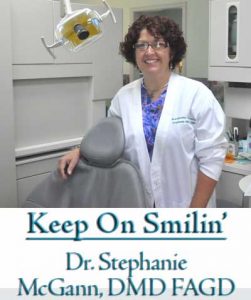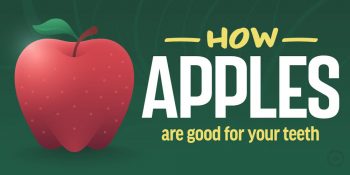By Dr. Stephanie McGann, DMD FAGD, Columnist, The Times
 We’ve all heard that “An apple a day keeps the doctor away.” This old adage has been around for more than 100 years. While there is no real empirical evidence that regularly eating an apple will replace your primary care physician, there is plenty of evidence that apples are a healthy choice.
We’ve all heard that “An apple a day keeps the doctor away.” This old adage has been around for more than 100 years. While there is no real empirical evidence that regularly eating an apple will replace your primary care physician, there is plenty of evidence that apples are a healthy choice.
The vitamins, minerals and fiber are good for our bodies. But how many of us know that they are also good for our teeth? Dental research has looked at various foods for their effects either positive or negative on the teeth. Phenols in apples can reduce the ability of cavity causing bacteria to stick to teeth. Antioxidants can help prevent periodontal disease, along with many other health benefits. Apples grown in some parts of the country contain trace amounts of fluoride. Very good for the development of strong teeth and decay prevention.
Now – there is always conventional wisdom that suggests that chewing a crisp apple can help scrape away plaque on the teeth. Research does not support this. Eating apples will never replace twice daily brushing and flossing.
 Lastly, the act of chewing an apple stimulates saliva production. Saliva helps wash away food debris and bacteria. Saliva is very important to maintain healthy teeth and gums.
Lastly, the act of chewing an apple stimulates saliva production. Saliva helps wash away food debris and bacteria. Saliva is very important to maintain healthy teeth and gums.
Apples do contain plenty of sugar and some acids. So be sure to eat anything in moderation. A swish with water after eating an apple can reduce the amount of excess sugar left behind. As the science continues to look into how apples affect our teeth, one thing we know is true: regular dental visits, along with daily tooth brushing and flossing, is your best defense against tooth decay!
Dr. Stephanie McGann, who has more than two decades of dental practice experience, is a resident of the Unionville area and owns and practices at Rainbow Valley Dental, in Valley. She is a past President of the Chester/Delaware Dental Society and she is a Fellow of the Academy of General Dentistry.







